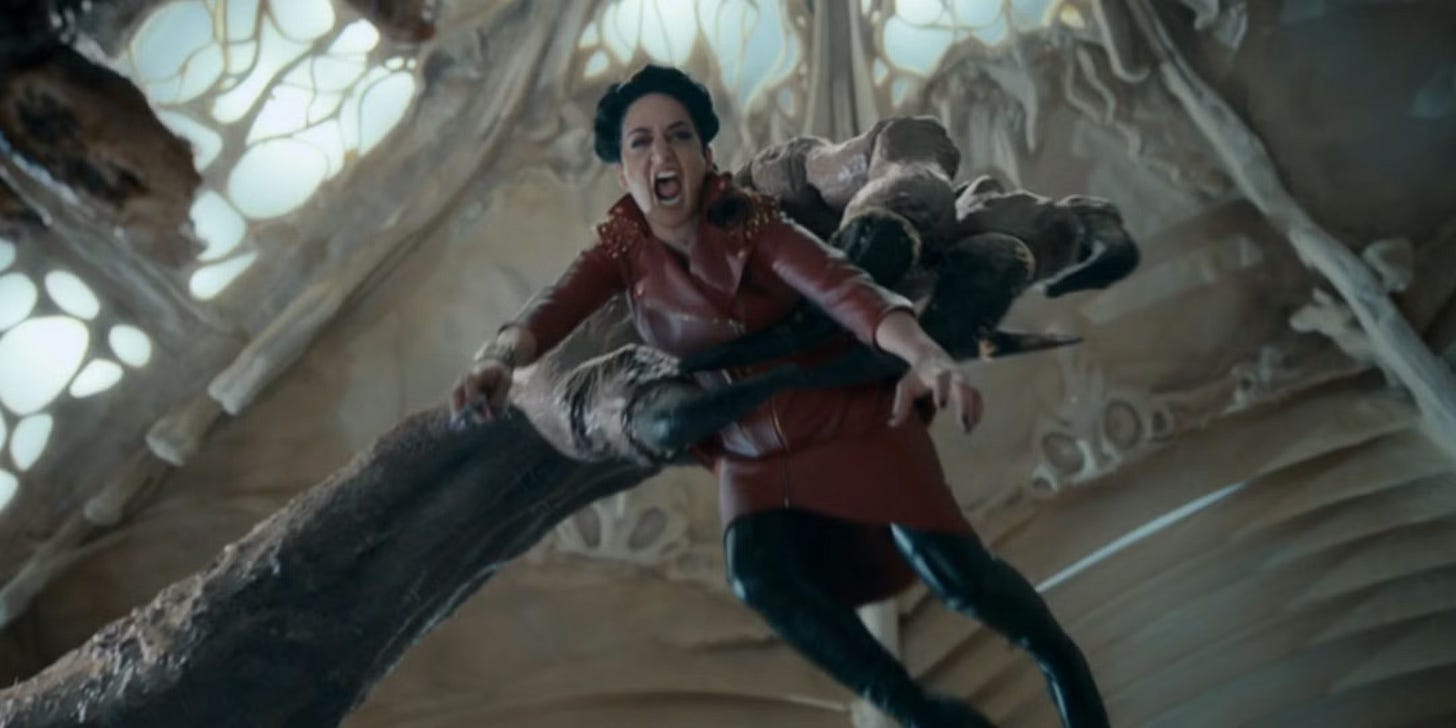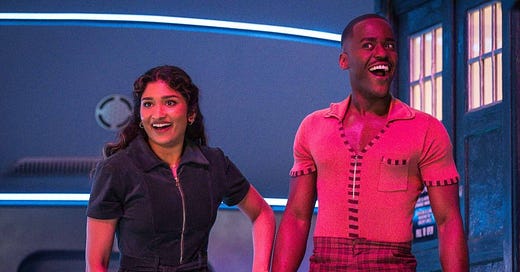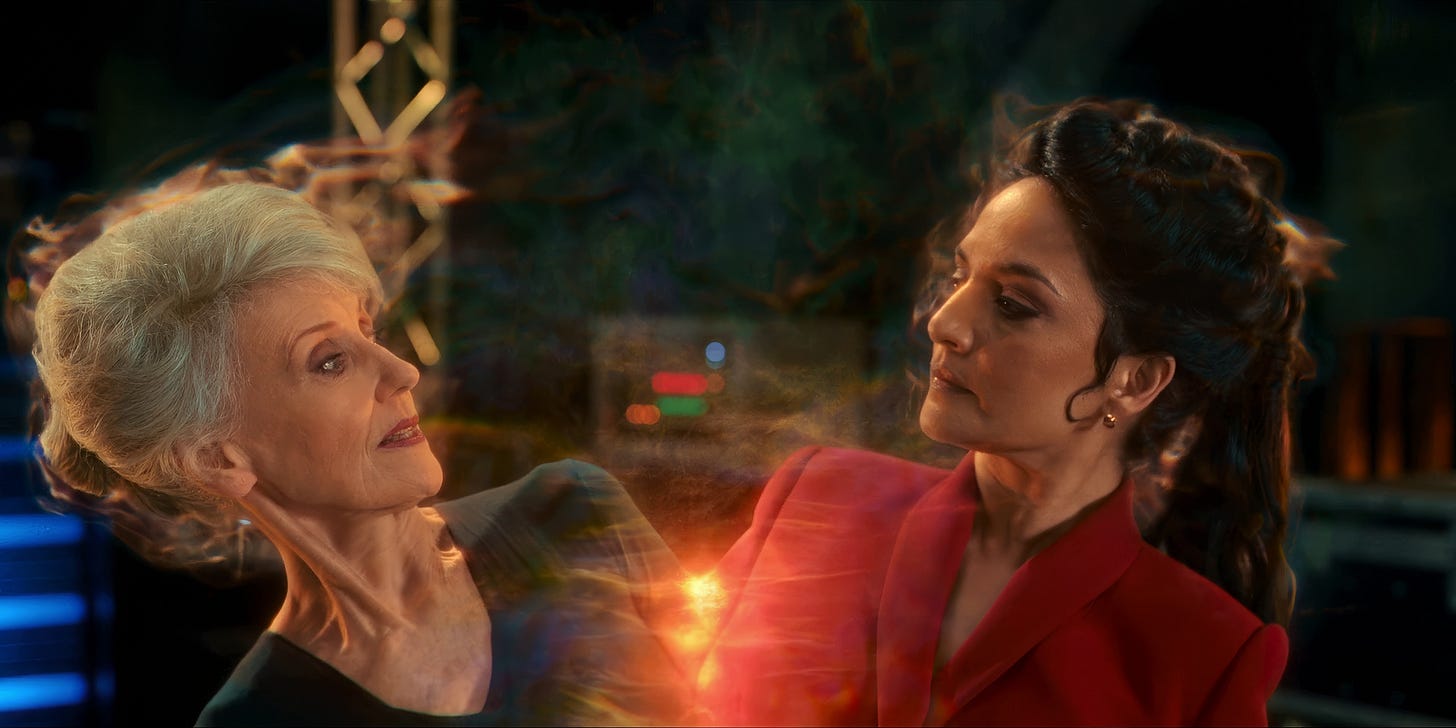‘Doctor Who’ and The Exposition Machine
Doctor Who has always been an exposition factory, but boy howdy things got out of hand.
NEW STANDARD DISCLAIMER: This newsletter aggressively spoils things.
I have written about Doctor Who and its commitment to exposition before, yes, but they just keep making more Doctor Who, and I am but a man1. A man with a deep rut of nerdiness that requires I watch every new season of Doctor Who no matter what. And every new season I hope it dials back the exposition just a little bit, and it never does. I fact, it just keeps leaning harder into exposition2. In Season 15 (Season 2 if you’re new here) the show entered heretofore unthinkable levels of exposition, leading up to a finale that was so crammed full of exposition it was, like the TARDIS, essentially larger on the inside than the outside. The Season 2 finale, ‘The Reality War,’ was somehow three hours of episode in one hour and six minutes3.
As noted, this is a show that has always been larded with exposition, as it regularly introduces civilizations, characters, legends, myths, and apocalyptic artifacts that the audience has never heard of and attempts to fill in the blanks as efficiently as possible so we give a crap about the outcome4. But recent seasons have had another challenge that’s exacerbated the exposition problem to the point where entire episodes are essentially one long expository wheeze: The continuity.
Old Friends
Doctor Who dates back to 1963. It ran in its original form until 1989, went off the air, and came back in 2005. In the most recent seasons, returning showrunner Russel T. Davies offered up a Doctor who was shorn of much of the angst and darkness the character had been accumulating over the years as they moved through Time Lord Victorious and Lonely God phases5. He jerry-rigged a “bigeneration” that split the character into the old and busted version and the new, improved version. More cheerful and freespirited (and played by charisma machine Ncuti Gatwa), the 15th Doctor promised a fresh start. But to balance that out, Davies reached back into the show’s canon for some old-school, classic villains and characters, bringing back figures like The Rani, Sutekh, and Omega. This was kind of exciting for folks who knew who these figures were, but the portion of the audience who only started watching Doctor Who in 2005 (or 2011, or 2018) would be mystified6.
The answer: Buckets of exposition.
Twisty Plots

At the same time, Doctor Who has also always been about those timey-wimey, complex plots to destroy the universe or shatter reality or annihilate the human race7. It’s a feature of the show that the stories often make sense only in the most superficial of ways, especially when it comes to the bombastic season finales.
This latest finale is no exception: The Rani has returned with a more or less on-brand batshit plot to shatter reality so she can reach through ... something ... and retrieve Omega, the baddest and worst Time Lord, so he can help repopulate the race of Time Lords, the few surviving examples of whom are sterile8. This requires a ... baby who is the god of wishes? ... and ... a reality made of wishes that is so poorly composed it makes people doubt reality, and every expression of doubt thins out reality a little9?
Who knows. Despite the show’s best efforts, which includes a few lengthy speeches to get everyone up to speed on the status of the Time Lords, who in hell Omega is, where in hell Omega’s been, and several other deep cut Doctor Who bits of business, it’s all still a bit wobbly. But the answer to how to get all this crammed into the episode is exactly the same: Buckets of exposition.
But here’s where you might expect me to sneer and write about how this is all weak sauce and how better writers could have handled things better10, but I’m actually not going to. Because sometimes you have to use exposition like this. It gets a bad rap, but exposition is just a tool like anything else. Often—very often—it’s a bad tool that makes your writing worse. But sometimes it’s a necessary tool, like when you need to get an audience up to speed about 40 years of Doctor Who history and a complex plot in about three minutes. The key to effective writing is often knowing what tools to use and when to use them, and I shudder to think of Doctor Who if they attempted to fold in all this information gracefully. Every episode would be seven hours long11.
At this point, no one knows whether Doctor Who will return any time soon. Gatwa is out as The Doctor, as is Varada Sethu as companion Belinda. Ratings haven’t been great, and I’ve been frankly exhausted these last few years due to the endless breathless speeches explaining things, so maybe it’s not a bad time for the show to take a little break12. Reinvent itself properly. Come roaring back in a few years with a fresh take. One thing we know for certain is that no matter how long that takes, or how fresh the take is when it happens, this is Doctor Who, so there will be exposition.
Now, if I met The Doctor and they took me on as a Companion13, I’d probably get lost in the TARDIS and never seen again. I mean, I get lost in much smaller spaces. It’s kind of my brand.
NEXT WEEK: The Fine Art of the Bullshit Dream Sequence
If you enjoy this newsletter, consider subscribing to my paid fiction Substack, Writing Without Rules: From the Notebook!
Not in the sense of emotional maturity and stability and the ability to catch fish or anything, of course.
Just like my loved ones hope I’ll dial back on the pantslessness, and I just keep leaning harder into not wearing pants.
I imagine the behind-the-scenes footage that is eventually released will be a supercut of actors sitting slumped over with oxygen masks on their faces.
And usually fails.
Beginning to think we reached peak nuWho with the Capaldi Era. I mean, no one else delivers lines like these.
Also: Unimpressed. Thanos these villains are not.
Who then completely forget the alien invasion-slash-disintegration of the universe almost immediately. Which … scans.
The Rani, FYI, is an immortal regenerating Time Lord who is also a lunatic genetic scientist.
I should really stop analyzing Doctor Who plots. You start writing them out in sentences and suddenly you’re questioning most of your life choices, especially the ones involving watching Doctor Who.
Better writers probably wouldn’t use “better” twice in one sentence like that. Let it drift.
Although if it was seven hours of Gatwa dancing and vamping for us, I’d probably still watch it. I want him as a friend.
Not me. I’ll be here buzzing in your ears about my “work” forever more, suckers.
Has no one ever addressed the blatant sexytimes undertones of the term companion on this show? I mean, Time Lords do be getting lonely in the TARDIS.






There’s a simple option: it’s time for the Doctor to go on vacation. Preferably with his 300-pound Sontaran attorney.